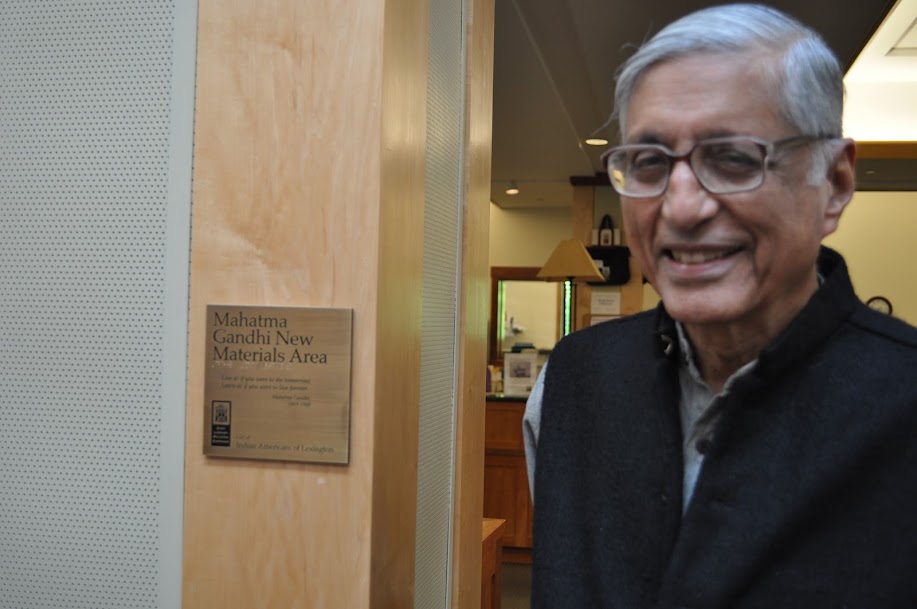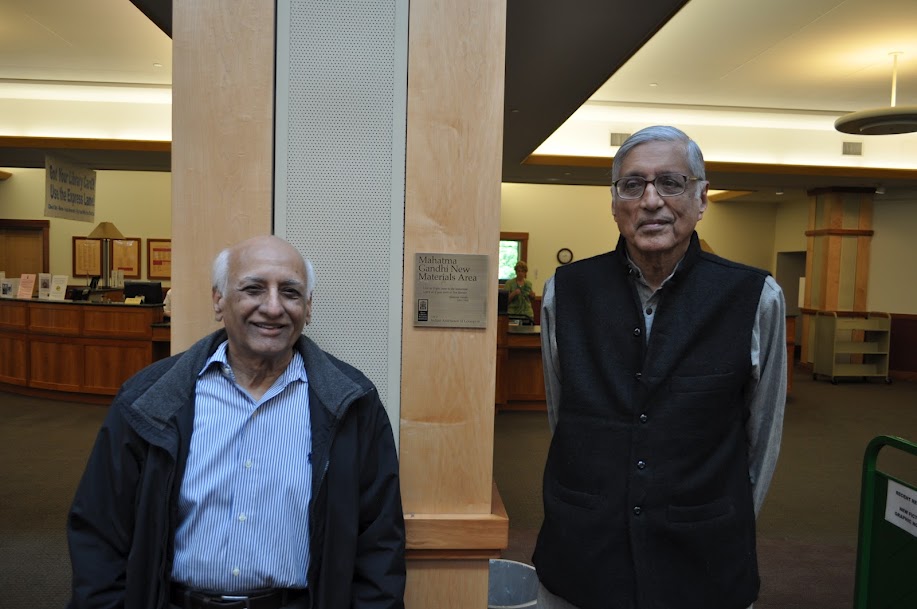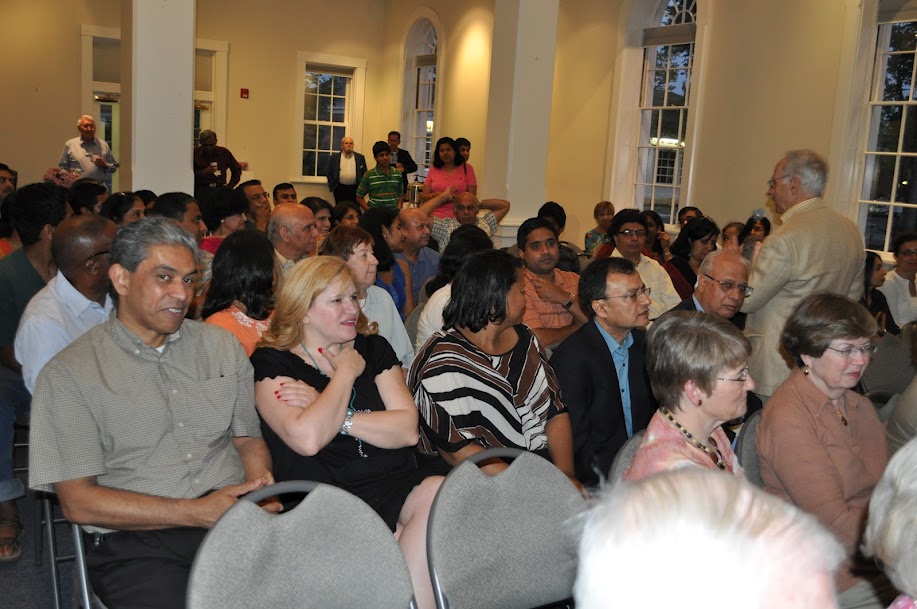Contribute
| In Conversation With Rajmohan Gandhi |
Ranjani Saigal
06/20/2012
What would the grandson of two of the greatest men that India or indeed the world has seen look like? What would his demeanor be? Would he share insights into personal stories of his time with Gandhi? I was filled with so many questions as I walked into the home of Puran Dang in Lexington, MA who was hosting Rajmohan Gandhi.The moment I lay my eyes on Rajmohan Gandhi, I was surprised to see a splitting image of his maternal grandfather Chakravarthy Rajagopalachari (Rajaji), the first Governor General of India. For many Indians of my generation Rajaji’s English versions of the Ramayana and Mahabharata were first real introduction to these epics and thus can be considered a spiritual Guru. He is also the composer of the immortal classic Tamil song, “Kurai Ondru Illai†that still stirs the soul of the listener at any concert.
After I get over the initial awe, we settled down for a conversation. My first two questions – What is like to have two of the greatest men in the world as grandfathers? Could you describe your relation with them?
With a smile he responds, “Since they were the only ones I had, I have no way of comparing them to others. So I cannot quite answer that.†Sensing my slight disappointment in his not reeling of a lot of intimate details he immediately continued, “I understand your question of course. From a very young age I was aware that my grandfather Gandhi was not mine alone. He was always very affectionate to me and yet I rarely had any one-on-one interaction with him. During my early years he was in jail for long periods of time and hence my interaction with him was limited. Since Rajaji died only when I was thirty seven I of course knew him well and had a lot of interactions with himâ€
“I was given my name by Rajaji. As you can guess it is a combination of Rajagopalachari and Mohandas. When he heard the name, Gandhi teased Rajaji about the fact that he put Raj before Mohanâ€
Did he have the opportunity to learn about the scriptures from the man who re-introduced them to the younger generation? Does he know Tamil?
“I do not know Tamil. My parents decided to teach us neither Tamil nor Gujarati but Hindi so they could be fair. I do not have a flair for languages but some of my siblings do and they know Tamil. The interesting fact is that even Rajaji did not know Tamil well for a long time. He had never studied it. Gandhi is the one who urged him to really learn Tamil. Rajaji never taught me the scriptures. But my introduction to the scriptures came by reading Rajaji’s books â€
Gandhi was the very symbol of non-violence and yet arguably it was during his life that India saw gruesome violence. Why? “While his was a voice that spoke powerfully on behalf of non- violence, there were so many other almost equally powerful voices that advocated violence. There were times when Gandhi’s message was heard and at other times the opposing voices were louderâ€
It seems at times that Gandhi is revered more outside India than within. Why? â€Gandhi is like our conscience. We are not always comfortable with it and it is difficult to follow at times. â€
Gandhi delivered his message of non-violence decades ago and yet why do we continue to see violence? “ Since the early times messengers of peace like Buddha, Jesus Christ and Gandhi have preached non-violence. Unfortunately the opposing voices are also spreading their messages constantly and sometimes they win. We should continue to push for the message of non-violence.“
What do you think were the greatest tangible contributions of Gandhi to India? “He had tremendous influence on the crafting of the constitution which is arguably the most important document for every Indian. Ideas of equality for women and different minority and religious groups are guaranteed in our constitution. While today it may be taken as a given, at that time it was something that needed to be emphasized. Of course his influence is felt in so many other spheres, tangible and intangible around the worldâ€
Rajaji was a brilliant mind. What outstanding accomplishments of Rajaji would he highlight? “ Perhaps one of the lesser known, but perhaps a most significant one was his stance on nuclear disarmament. It was a cause he espoused early on In fact when he came to the US during Kennedy’s time, he had extensive discussions with Kennedy on the subject and I believe Kennedy was influenced by the conversation. I think those thoughts have influenced subsequent policies on nuclear disarmament.
Why did the Gandhi family, unlike the Nehru family not take center stage in India’s politics? “For Gandhi, the entire nation was his family. So of course so many of his children took to politics. “
What is his message to Indians of today? “As India moves forward as a power on the world stage it is important for India and Indians to understand and put forth what its values are. It is important that Indians introspect carefully and put forth the right values, for the values will be critical in shaping the future of not only India but also the worldâ€.
While there was so much to ask and much for him to share he needed to leave for his evening event at the Depot Square about his new book Gandhi and Lincoln.
Meeting Rajmohan Gandhi it was clear that he carries the mantle of his two amazing grandfathers with grace and dignity. I felt a great honor to have met him.
About Rajmohan Gandhi:
Rajmohan is a Research Professor at the Center for South Asian and Middle Eastern Studies, University of Illinois at Urbana-Champaign, USA.
A former member (1990-92) of the Rajya Sabha (the upper house of the Indian Parliament), Rajmohan Gandhi led the Indian delegation to the UN Human Rights Commission in Geneva in 1990. In the Indian Parliament he was the convener of the all-party joint committee of both houses addressing the condition of Scheduled Castes and Scheduled Tribes. Associated from 1956 with Initiatives of Change (formerly known as Moral Re-Armament), Rajmohan Gandhi has been engaged for half a century in efforts for trust-building, reconciliation and democracy and in battles against corruption and inequalities. These efforts, made in India and across the world, have involved writing, speaking, public interventions, and organizing dialogues.
In the 1960s and early 1970s, he played a leading role in establishing Asia Plateau, the 67-acre conference centre of Initiatives of Change in the mountains of western India. Asia Plateau has been recognized in the Indian subcontinent for its ecological contribution.
During the 1975-77 Emergency in India, he was active for democratic rights personally and through his weekly journal Himmat, published in Bombay from 1964 to 1981. He has worked consistently for India-Pakistan and Hindu-Muslim reconciliation. Since 9/11, he has also tried to address the divide between the West and the world of Islam. A Muslim-non Muslim dialogue at Caux, Switzerland, in 2002 was one such initiative. He was unanimously elected President of Initiatives of Change International for a two-year term, 2009-2010.
At the University of Illinois he has taught political science and history courses from 1997. His latest book, A Tale of Two Revolts: India 1857 & the American Civil War (New Delhi: Penguin India, December 2009), studies two 19th-century wars occurring in opposite parts of the world at almost the same time.
His previous book, a biography of his grandfather Mahatma Gandhi, Mohandas: A True Story of a Man, His People and an Empire, received the prestigious Biennial Award from the Indian History Congress in 2007. It has since been published in several countries. In 2002 he received the Sahitya Akademi (India’s National Academy of Letters) Award for his Rajaji: A Life, a biography of Chakravarti Rajagopalachari (1878-1972), his maternal grandfather and a leading figure in India’s freedom movement who became Governor General, 1948-50.
Other books include Ghaffar Khan: Nonviolent Badshah of the Pakhtuns (Penguin 2004); Revenge & Reconciliation: Understanding South Asian History (Penguin, 1999); Patel: A Life, a biography of Vallabhbhai Patel (1875-1950), Deputy Prime Minister of India, 1947-50 (Navajivan, Ahmedabad, 1990); and Eight Lives: A Study of the Hindu-Muslim Encounter (SUNY, 1987).
In 2004 he received the International Humanitarian Award (Human Rights) from the City of Champaign, and in 1997 he was awarded an honorary doctorate of law from the University of Calgary (Canada) and an honorary doctorate of philosophy from Obirin University, Tokyo.
You may also access this article through our web-site http://www.lokvani.com/


Rajmohan Gandhi With Puran Dang
